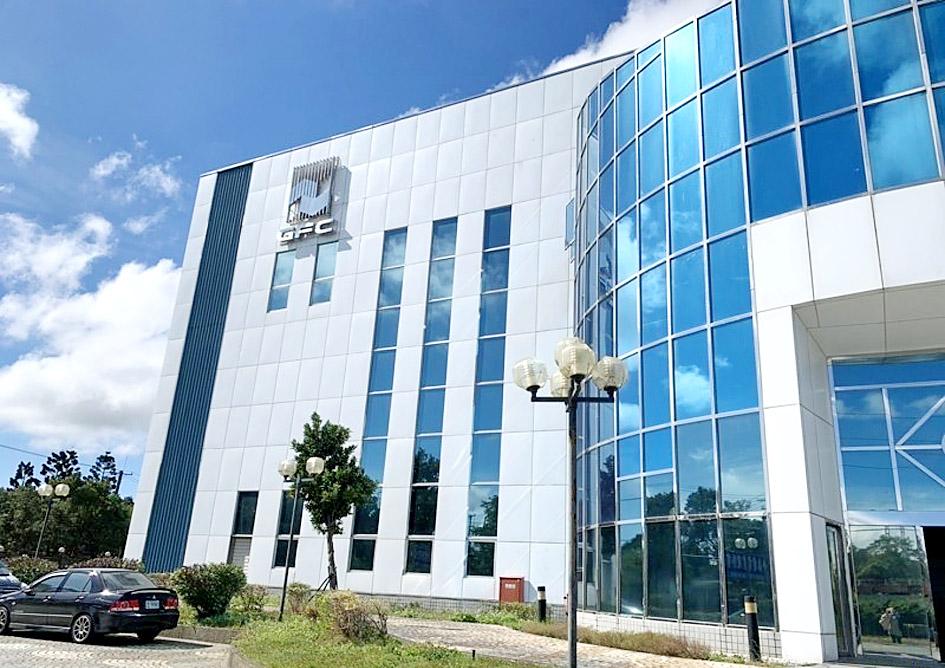Elevator and escalator supplier Golden Friends Corp (GFC, 崇友實業) is positive about business this quarter, supported by new demand, as well as maintenance and replacement needs amid a property boom and a vibrant economy.
The Taipei-based company gave the upbeat assessment after posting a 21.27 percent increase in revenue for last quarter to a record NT$1.26 billion (US$45.54 million).
Golden Friends attributed the revenue growth to profit recognition from selling elevators to public housing projects in Taipei’s Neihu (內湖) and Nangang (南港) districts, as well as effective replacement promotion campaigns.

Photo: Lin Jing-hua, Taipei Times
Replacement business soared 36.63 percent year-on-year in the October-to-December period, while its maintenance arm served 38,845 elevators, it said in a statement.
The firm sells elevators and escalators under its own GFC and Genesis brands, and has been a contract maker for Japan’s Toshiba elevators and escalators.
The boom in the local property market has led developers to accelerate housing project construction and the process has benefited Golden Friends, it said, adding that strong elevator sales would shore up business at its maintenance division.
For the whole of last year, the company’s revenue grew 4.82 percent year-on-year to NT$4.61 billion, it said.
Looking forward, Golden Friends said that it would seek to expand its market share and customer base by developing high-speed elevators equipped with Internet of Things and facial recognition technologies.
Order visibility looks bright this quarter, as it has signed deals to supply elevators for luxury home projects and international tourist hotels in Taichung, it said.

MULTIFACETED: A task force has analyzed possible scenarios and created responses to assist domestic industries in dealing with US tariffs, the economics minister said The Executive Yuan is tomorrow to announce countermeasures to US President Donald Trump’s planned reciprocal tariffs, although the details of the plan would not be made public until Monday next week, Minister of Economic Affairs J.W. Kuo (郭智輝) said yesterday. The Cabinet established an economic and trade task force in November last year to deal with US trade and tariff related issues, Kuo told reporters outside the legislature in Taipei. The task force has been analyzing and evaluating all kinds of scenarios to identify suitable responses and determine how best to assist domestic industries in managing the effects of Trump’s tariffs, he

TIGHT-LIPPED: UMC said it had no merger plans at the moment, after Nikkei Asia reported that the firm and GlobalFoundries were considering restarting merger talks United Microelectronics Corp (UMC, 聯電), the world’s No. 4 contract chipmaker, yesterday launched a new US$5 billion 12-inch chip factory in Singapore as part of its latest effort to diversify its manufacturing footprint amid growing geopolitical risks. The new factory, adjacent to UMC’s existing Singapore fab in the Pasir Res Wafer Fab Park, is scheduled to enter volume production next year, utilizing mature 22-nanometer and 28-nanometer process technologies, UMC said in a statement. The company plans to invest US$5 billion during the first phase of the new fab, which would have an installed capacity of 30,000 12-inch wafers per month, it said. The

Taiwan’s official purchasing managers’ index (PMI) last month rose 0.2 percentage points to 54.2, in a second consecutive month of expansion, thanks to front-loading demand intended to avoid potential US tariff hikes, the Chung-Hua Institution for Economic Research (CIER, 中華經濟研究院) said yesterday. While short-term demand appeared robust, uncertainties rose due to US President Donald Trump’s unpredictable trade policy, CIER president Lien Hsien-ming (連賢明) told a news conference in Taipei. Taiwan’s economy this year would be characterized by high-level fluctuations and the volatility would be wilder than most expect, Lien said Demand for electronics, particularly semiconductors, continues to benefit from US technology giants’ effort

‘SWASTICAR’: Tesla CEO Elon Musk’s close association with Donald Trump has prompted opponents to brand him a ‘Nazi’ and resulted in a dramatic drop in sales Demonstrators descended on Tesla Inc dealerships across the US, and in Europe and Canada on Saturday to protest company chief Elon Musk, who has amassed extraordinary power as a top adviser to US President Donald Trump. Waving signs with messages such as “Musk is stealing our money” and “Reclaim our country,” the protests largely took place peacefully following fiery episodes of vandalism on Tesla vehicles, dealerships and other facilities in recent weeks that US officials have denounced as terrorism. Hundreds rallied on Saturday outside the Tesla dealership in Manhattan. Some blasted Musk, the world’s richest man, while others demanded the shuttering of his